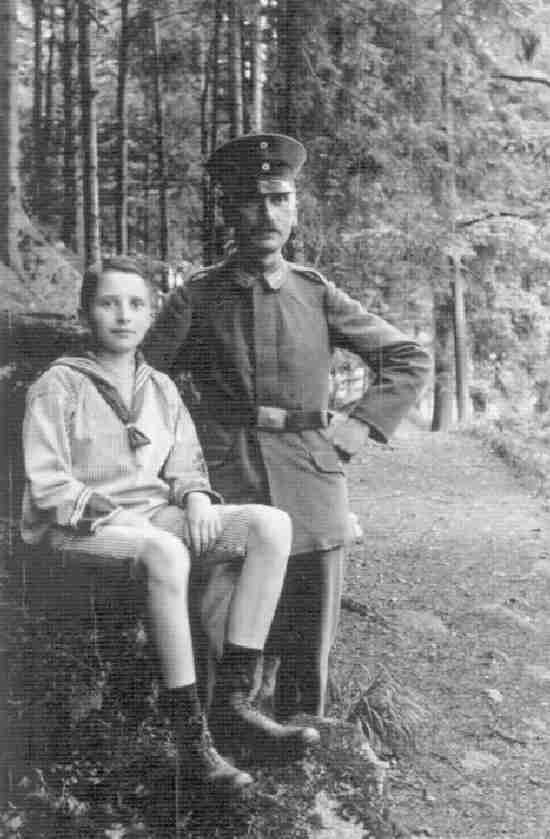
World War I: Home Leave

Figure 1.--We have no information about this image. We believe, howevr, that it was taken during this German soldier's home leave. We are not sure about the soldier's rank. His son who looks to be 11-12 years old wears a sailor suit, a popular style for German boys. The photograph looks like the two were out on a hike. Image courtesy of the RS collection.
|
Many countries had home leave policies allowing soldiers to spend a few days at home out of the front lines. This made it possible to visit with parenbts and family for a few days away from the fighting. I am not ure how often these leaves were granted. Such policies varied from country to country. The War on the Western Front was conducted over a stable battle front very near to French and German cities. Soldiers could get on a train near the frnt line and be at home within hours. England was also close, only the minor complication of a Channel crossing. Americans were in the War only a little over a year. Crossing the Atlantic mae home leaves infeasible. We have little actual information on the home leave policies of combatant countries. Many studies of World War I do not even mention this subject.
America
Americans were in the War only a little over a year. Crossing the Atlantic mae home leaves infeasible.
Australia
I am not sure how leave was handled for the Australians. I don't believe that they were allowed to go home. Those on the Westrn Front might visit family in England. I'm unsure about those involved in the Middle East.
Austria-Hungary
Belgium
Most of Belgium w overun by the Germans in August 1914. The gallant Belgian army continued fighting. Most could, however, not go home a it was occupied by the Germans.
Canada
We note a Canadian pilot,Billy Bishop, receiving home leave. We are unsure about Cananian enlisted men.
England
The War on the Western Front was conducted over a stable battle front very near to French and German cities. Soldiers could get on a train near the frnt line and be at home within hours. England was also close, only the minor complication of a Channel crossing.
France
The War on the Western Front was conducted over a stable battle front very near to French and German cities. Soldiers could get on a train near the frnt line and be at home within hours.
Germany
The War on the Western Front was conducted over a stable battle front very near to French and German cities. Soldiers could get on a train near the frnt line and be at home within hours. We note German soldies being given 8 day home leaves. How often these came I donot know. We note one account of a home leave, that of Adam Simmermacher. "Finally, on 7 January 1916, I was given home leave. On my journey
home I passed Baupaume over Charleville, the base of our Crown
Prince Max. In the morning of the 8th, a Saturday, I arrived in
Saarbrücken. My train arrived at the station there at precisely the
same time that I had left Mainz the previous year. From there I first
went to Gießen.
As a railway man, my brother Georg was considered indispensable
and thus exempt from conscription. He spent the entire war with his
family in Gießen. We three brothers in the field were glad that at
least one of us four was able remain at home; one less brother to
fret about.
My eight-days-long leave left me with many happy memories. On
Saturday evening I took the train to Darmstadt where my brother
Johann awaited my arrival at the station. I met a good few day
trippers from my village there. I spent the night at Johann’s place in
Nieder-Ramstadt, and travelled back with him to Darmstadt where
I visited my sister and my noble sponsor, Frau Fey, at whose villa
she persuaded me to stay. Wednesday morning I went to the
Odenwald where I remained until Saturday. During those days
back home I missed my parents like never before. I would have
liked to stay on for Sunday as well, especially as I knew that I
wouldn’t be able to catch up with my company. Yet, my sense of
duty cautioned me to leave in good time.
On my way back I was again a guest of the Feys, who took the
opportunity to kit me out with new underwear. Moreover, Frau Fey
said that she would put in a good word for me with my regiment
commander, Oberstleutnant (Chief Lieutenant) Baron von
Preuschen. So now, having seen out a whole year in the trenches, I
would get something better, she said. She thought of a post as an
orderly, attendant or such like. But her patronage yielded no fruit.
When my commander eventually remembered me, I had already
been wounded. [Simmermacher, chapter 4.]
Italy
Russia
Turkey
Sources
Simmermacher, Gunther. "The War Mmoirs of Adam Simmermacher: World War 1--A Soldier for the Kaiser Remembers (2002).
HBC

Navigate the Boys' Historical Clothing Web Site:
[Return to Main World War I conduct page]
[Return to Main military style page]
[Introduction]
[Activities]
[Biographies]
[Chronology]
[Clothing styles]
[Countries]
[Bibliographies]
[Contributions]
[Essays]
[FAQs]
[Glossaries]
[Satellites]
[Tools]
[Boys' Clothing Home]
Created: October2, 2003
Last updated: October 2, 2003



